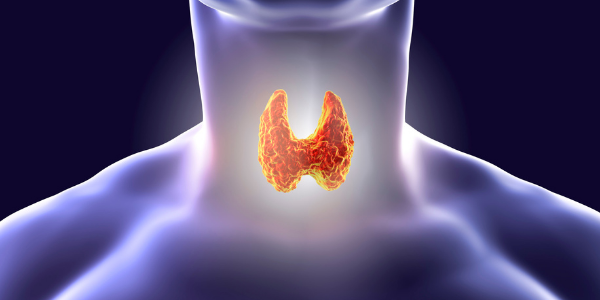
What are the Early Warning Signs of Thyroid Problems?

Thyroid disease affects as many as 20 million Americans, according to the National Thyroid Association.
What’s more, approximately 60% of people with a thyroid disease don’t realize they have one.
Thyroid disease can cause many life-disrupting symptoms. It can impact mood, weight, energy levels, sleep, and more.
We’ll go over how to identify the early warnings signs of thyroid disease, and how to seek treatment.
Thyroid Disease: Early Warning Signs
There are two main types of thyroid disease: hypothyroidism, where the body produces too little of thyroid hormones T3 and T4, and hyperthyroidism, where the body produces too much.
Hyperthyroidism and hypothyroidism can have many causes, including growths and tumors, iodine deficiency or excess, genetic conditions, and others.
The early warnings signs of Hypothyroidism:
- Fatigue and general tiredness
- Sensitivity to cold
- Weight gain
- Muscle weakness and cramping
- Lethargy and slowed thinking
- Depression and difficulty managing mood
- Dry, brittle hair and skin
- Swelling of the thyroid gland
- Nodules on the thyroid gland
The early warnings signs of Hypothyroidism:
- Anxiety, nervousness, and excess energy
- Mood swings
- Insomnia and difficulty sleeping
- Sensitivity to heat
- Weight loss
- Gastrointestinal issues like diarrhea
- Swelling of the thyroid gland
- Nodules on the thyroid gland
The early warning signs of thyroid problems are difficult to identify.
Because the symptoms are general, they can be confused with other conditions. You may think stress is causing your sleeplessness and fatigue, for example. But to identify thyroid disease early, it’s important to keep track of your symptoms.
If you find you have one or more symptoms consistently over time, you should check your thyroid health as early as possible.
More serious complications can develop, including hair loss, heart palpitations, thyroid eye disease, goiter, and more. If a cancerous growth is causing thyroid disease symptoms, the cancer could spread to other parts of the body, as well.
If you’re experiencing any hypothyroid or hyperthyroid symptoms, the next step is blood testing to check your thyroid hormone levels, and to check for certain antibodies that affect the thyroid.
How to Test for Thyroid Disease
Thyroid conditions affect the production of thyroid hormones. Checking the levels of these hormones can help uncover a potential thyroid issue. Certain autoimmune conditions cause specific types of antibodies that impact the thyroid, and these can also be measured in the blood.
Thyroid Stimulating Hormone (TSH)
This hormone stimulates the release of thyroid hormones T3 and T4. Abnormal levels can identify a thyroid concern.
If TSH levels are high, you could be experiencing hypothyroidism and your body is producing more TSH in an effort to increase hormone production.
If TSH levels are too low, it could mean the body has stopped producing TSH in an effort to counteract hyperthyroidism.
TSH is a standard screening test for thyroid disease. Your provider may order this test first (or you can order it yourself through Defy Medical’s direct lab service), and then order further testing if your TSH levels are abnormal.
Free T3
This test measures the amount of unbound T3 in the blood.
T3, also known as triiodothyronine, is an important marker of thyroid function. It’s the most active form of thyroid hormone and supports metabolic health, regulates weight, provides energy, and more.
If T3 levels are too low or too high, it can indicate a thyroid issue.
Free T4
T4 is a less active form of thyroid hormone. The majority of T4 is converted to T3, which is then utilized by the body. Free T4 levels in the blood indicate the overall health of the thyroid.
Measuring T4 also helps identify whether the body is struggling to convert T4 to T3, which can lead to a thyroid problem even if the thyroid is producing adequate hormone levels.
Reverse T3
When T4 is metabolized into T3, it also produces reverse T3 (RT3) as a byproduct. Typically, the conversion produces more T3 and rT3. If the body is struggling with this process, however, it may produce too much rT3.
Because rT3 can’t be utilized in the same way as T3, high rT3 levels can lead to hypothyroidism and thyroid disease symptoms.
Thyroid Peroxidase Antibodies (Anti-TPO)
This test can identify whether you have thyroid autoimmune disease like Hashimoto’s disease or Graves’ disease.
Thyroid peroxidase (TPO) is an enzyme that supports the production of thyroid hormones. If there are TPO antibodies in your blood, it indicates an autoimmune disease that affects the thyroid.
Antibodies are proteins that attack a specific target, called an antigen. When you have an autoimmune disease, antibodies mistakenly attack healthy tissues and substances, like TPO.
Thyroglobulin Antibodies (TgAb)
This is another type of antibody, and elevated levels of TgAb can indicate a thyroid-related autoimmune disease or thyroid cancer.
Thyroglobulin is a protein produced by the thyroid. When combined with iodine, thyroglobulin creates hormones T3 and T4. If antibodies begin destroying this protein, then hypothyroidism is a common result.
It’s very important to screen for TgAb so you can catch a serious autoimmune disease or thyroid cancer as early as possible.
Defy Medical offers access to individual thyroid tests as well as the Complete Thyroid Panel to check your thyroid health. You can also book a consultation to discuss your results in-depth and access treatment, if necessary.
Thyroid Disease Treatment
If your thyroid tests show the early signs of thyroid disease, the next step is treatment.
Your thyroid disease treatment depends on which condition is causing your hypothyroidism or hyperthyroidism.
Thyroid conditions include:
- Hashimoto’s Disease — An autoimmune disease that causes the body to attack the thyroid, leading to hypothyroidism.
- Graves’ Disease — An autoimmune disease that causes the overproduction of thyroid hormone, leading to hyperthyroidism.
- Idiopathic Myxedema — Advanced, undiagnosed hypothyroidism that leads to body swelling.
- Thyroiditis — Swelling of the thyroid gland that can be caused by other thyroid conditions, like Hashimoto’s disease.
- Goiter — An enlarged thyroid or noticeable nodules on the thyroid, which can be caused by numerous thyroid conditions.
- Thyroid Cancer — Cancerous growths can cause thyroid dysfunction. While thyroid cancer is rarer than other thyroid conditions, it’s a serious disease that needs to be caught early for effective treatment.
- Thyroid damage or removal — If the thyroid has been damaged or removed, patients will experience hypothyroidism symptoms due to the lack of hormone production
Hypothyroidism Treatment
Generally, hypothyroidism is treated with Thyroid Hormone Replacement Therapy.
This means patients take thyroid hormone medication to optimize their thyroid hormone levels. Patients usually supplement with T4 since it’s transformed into T3. They may also take a combination of T3 and T4.
Depending on the cause of the hypothyroidism, other treatments may be necessary. For example, steroid medication may be prescribed to help with severe thyroiditis and swelling.
Hyperthyroidism Treatment
Hyperthyroidism is typically treated with medications that slow the production of thyroid hormones. Medications include thionamides like Methimazole and Propylthiouracil (PTU), as well as radioactive iodine to kill thyroid cells.
If the hyperthyroidism is severe or caused by cancer, the patient may have a thyroidectomy to remove some or all of the thyroid gland. In this case, patients would need to begin Thyroid Hormone Replacement Therapy to replenish their thyroid hormone levels.

Catch the Early Warning Signs of Thyroid Problems with Defy Medical
It’s important to monitor your symptoms so you can catch thyroid disease early. Defy Medical offers access to affordable lab testing so you can screen for hyperthyroidism and hypothyroidism.
If you’re diagnosed with a thyroid condition, Defy Medical offers access to treatment like Thyroid Hormone Replacement Therapy to help you feel better and have more energy.
Ready to learn more?
Get Started

